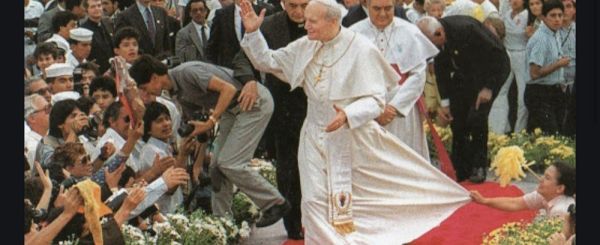1. "Woe to me if I did not preach the gospel" (1 Cor 9:16).
These words were written by Saint Paul the Apostle in his first letter to the Corinthians.
These words echo strongly in different epochs, among different generations of the Church.
In our times they were heard, particularly strongly, during the Synod of Bishops in 1974 on the topic of evangelisation. The theme arose from the vast substratum of the teaching of the Second Vatican Council and the rich soil of the Church's experience in the contemporary world. The fruit of the work of that Synod was passed on by the participating bishops to Pope Paul VI, and found its expression in the splendid apostolic exhortation Evangelii Nuntiandi.
"Woe to me if I did not preach the Gospel," says Saint Paul. And he adds: 'For it is not a boast for me to preach the Gospel; it is a duty for me' (1 Cor 9:15)... I only fulfil the duties of a minister!
And so: not for boasting, but also not for reward!
Indeed, the reward is the very fact that I can preach the gospel without any reward.
And then he writes: "For although I was free from all, I made myself the servant of all" (1 Cor 9:19).
It would be difficult to find words, which could say more: to preach the Gospel is to become "a servant of all in order to gain the greatest number" (1Cor 9:19). And developing the same idea, he adds: "I have made myself weak with the weak in order to gain the weak; I have made myself all things to all men, in order to save someone at any cost. I do everything for the sake of the Gospel, to become a sharer with them" (1Cor 9:22-23).
The theme we are invited to meditate on at today's meeting is therefore evangelisation.
2. Paul VI's apostolic exhortation Evangelii Nuntiandi reminds us that the first evangeliser is Christ himself.
Let us look in the light of today's liturgical pericope at what a day (and night) of Christ's evangelising activity looks like.
We find ourselves in Capernaum.
Christ leaves the synagogue and, together with James and John, goes to the house of Simon and Andrew. There he heals Simon's mother-in-law (Peter), so that she can immediately get up and serve them.
After the setting of the sun, "all the sick and the possessed are brought to Christ. The whole city was gathered before the gate" (Mk 1:32-33). Jesus does not speak, but performs the healing: "He healed many who were afflicted with various diseases and cast out many demons". At the same time, a significant remark: "he did not allow the demons to speak, because they knew him" (Mk 1:34).
Perhaps all this went on until late in the evening.
Early in the morning Jesus is already praying.
Simon comes with his companions, to tell him: "Everyone is looking for you" (Mk 1:37).
But Jesus replies: "Let us go elsewhere to the neighbouring villages so that I may preach there also; for this is why I have come" (Mk 1:38).
We read later: "And he went throughout all Galilee, preaching in their synagogues and casting out demons" (Mk 1:39).
3. In summary, based on that day, spent in Capernaum, it can be said that the evangelisation conducted by Christ himself consists of teaching about the kingdom of God and serving the suffering.
Jesus performed signs, and all of these formed the whole of a Sign. In this Sign, the sons and daughters of the people, who had come to know the image of the Messiah, described by the prophets and especially by Isaiah, can discover without difficulty that "the kingdom of God is at hand": he is the one who "has taken upon himself our sufferings, he has borne our sorrows" (Is 53:4).
Jesus does not only preach the Gospel as they all did after him, e.g. the wonderful Paul, whose words we meditated on just now. Jesus is the Gospel!
A great chapter in his messianic service is addressed to all categories of human suffering: spiritual and physical.
It is not without reason that we also read today a passage from the book of Job, which illustrates the dimension of human suffering: "If I lie down, I say: When shall I rise? / The shadows are lengthening, and I am weary to toss and turn until dawn" (Job 7:4).
We know that Job, passing through the abyss of suffering, has reached the hope of the Messiah.
The psalmist speaks of this Messiah in the words of today's liturgy: 'The Lord rebuilds Jerusalem, / gathers the lost of Israel, / he mends the brokenhearted / and binds up their wounds ... / The Lord upholds the humble / but he brings down to the ground the wicked" (Ps 147 [146]:2.3.6).
This is precisely the Christ.
And this is precisely the Gospel.
Paul of Tarsus, who was one of the greatest proclaimers of the Gospel and knows its history, is fully aware that he shares in it: "All things I do for the sake of the Gospel, that I may be partakers of it" (1 Cor 9:23).
[Pope John Paul II, homily 7 February 1982]












